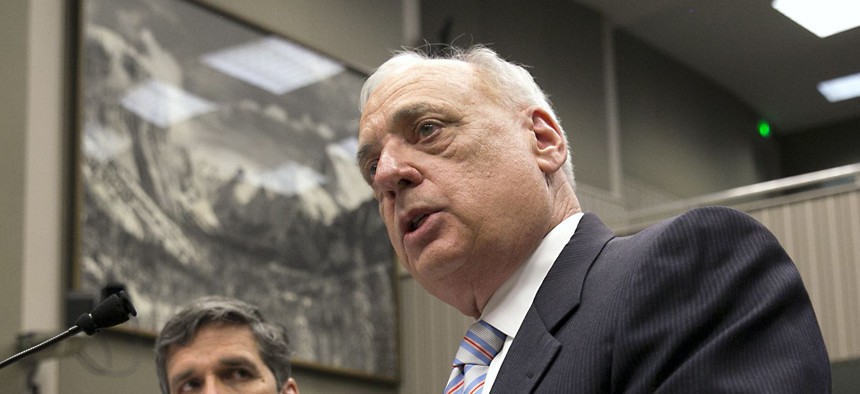If Cap-and-Trade Falters, What’s Next for California’s Bullet Train Funding?

Dan Richard, chairman of the board of the California High-Speed Rail Authority, discusses the release of a new business plan for the bullet train during a hearing of the Assembly Transportation Committee, in Sacramento, Calif., on March 28, 2016 Rich Pedroncelli / AP File Photo
Connecting state and local government leaders
A top high-speed rail official in the Golden State shares his thoughts on what could be a big stumbling block.
Where all of the money will ultimately come from to pay for an initial segment of California’s planned high-speed passenger train line is for now uncertain.
Dan Richard, who chairs the board of directors for the state’s High-Speed Rail Authority, acknowledges as much. “There are still some questions about whether the funding is all lined up,” he told Route Fifty by phone earlier this week.
The conversation with Richard focused mostly on a segment of the line that would connect the Bakersfield area, in California’s agriculturally rich Central Valley, with San Jose and San Francisco, two cities where the tech-sector is booming.
Costs for that roughly 250-mile stretch of rail line are expected to be in the $21 billion to $22 billion range, Richard said. The hope is to have it constructed by 2024, and trains operating in 2025.
A ballot measure California voters approved in 2008 cleared the way for around $9 billion of bond financing for the state’s bullet train project. Federal support accounts for about $3 billion more.
“Call that 12 billion,” Richard said.
High-speed rail also gets a portion of the proceeds from the state’s cap-and-trade program, which is aimed at limiting climate change. The cap-and-trade system features credits, which are sold at auction, and can be purchased by businesses like oil refineries to offset their carbon emissions.
Richard said the authority estimates that if the cap-and-trade program continues, the money from it, along with the bond financing, and the federal funds, would allow for the completion of the infrastructure needed for service between the Central Valley and the San Francisco Bay Area.
But there’s a catch. Cap-and-trade in California is facing obstacles.
A lawsuit, first filed about four years ago by the California Chamber of Commerce, could upend the program. Some of the initiative’s critics argue that it does not have the legal authority to exist past 2020. And auction revenues have at times fallen short of expectations.
Richard voiced optimism cap-and-trade would survive and stabilize. Although this could depend on whether the state Legislature acts to resolve questions now troubling the program.
But what happens if cap-and-trade ends up dead? Or if the funding from it does not flow to the rail project as anticipated?
“I don’t have a great answer for you sitting here today,” Richard said.
“I am not a guy who likes to pretend,” he added. “We would have challenges.”
The authority figures that, no matter what happens, cap-and-trade will probably provide a couple billion dollars in revenue, leaving a shortfall of about $7 billion for the segment of rail linking the Central Valley and the Bay Area.
There’s no immediate single source of funding that could be used to close that gap, according to Richard. Instead, he said, doing so would likely involve a “series of 20 percent solutions.”
One possibility Richard described centers on deals with local governments that see property values and tax revenues boosted by the arrival of high-speed rail service.
“There are a number of mechanisms that we’re looking at,” he said, “that would essentially involve cooperative agreements with local communities so that as property values, property taxes and so forth went up—sales taxes, receipts, things like that—we could share in them.”
Richard noted: “We have the opportunity here to create billions and billions of dollars of economic value around stations.”
There were other options he pointed to as well.
For instance, leasing the rail right-of-way so it could be used for solar power infrastructure, or fiber-optic cable.
Turning to the federal government for additional support could be another possibility. “We certainly won’t be embarrassed to ask,” Richard said.
The authority, he said, had not yet spoken with President-elect Donald Trump’s transition staff to discuss the rail project. “We’ll be ready to talk with the new administration when they’re ready to talk,” he said.
Trump has pledged to make infrastructure a priority for his administration. The proposals his team has revealed so far focus heavily on tax credits and private-sector financing.
Part of the business plan for the high-speed rail program in California is for a private entity to pay for the right to operate the line. The money the state earns from that arrangement, Richard explained, could be invested to build parts of the system.
As envisioned, the complete railway would cost an estimated $64 billion, and would run about 800 miles, between Los Angeles in the south and San Francisco in the north, with extensions serving San Diego and the state capital, Sacramento.
“It’s a huge program,” Richard said. “All transportation programs get funded in stages.”
Bill Lucia is a Reporter for Government Executive's Route Fifty and is based in Washington, D.C.

NEXT STORY: Laying the Groundwork for a Second Constitutional Convention



